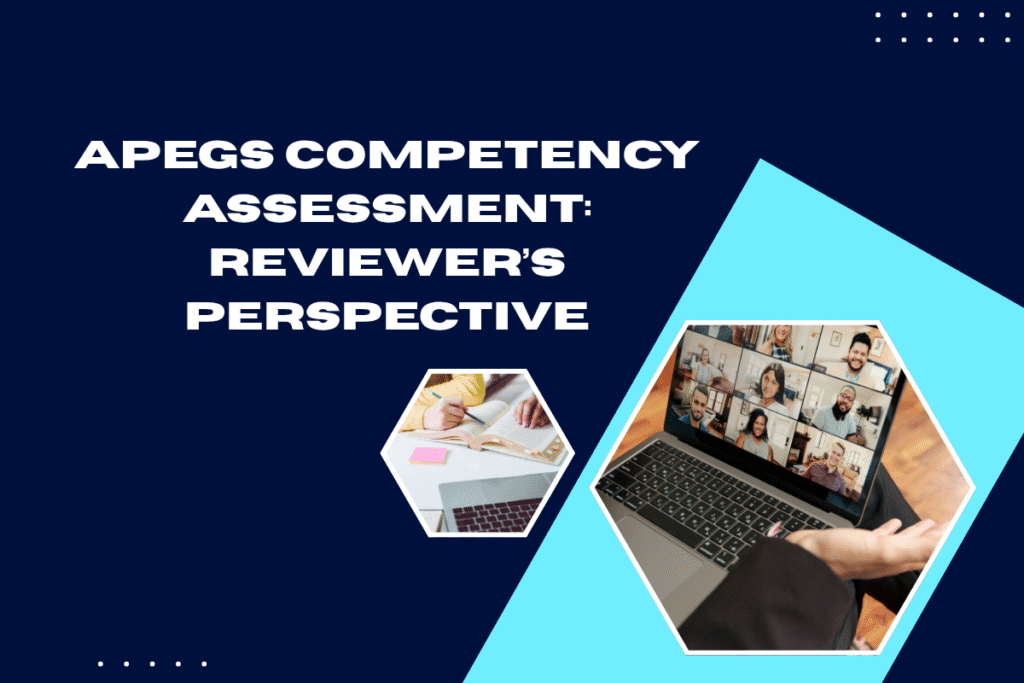The APEGS Competency Assessment is an essential step for engineers and geoscientists aiming to achieve professional registration. From a reviewer’s point of view, the process ensures that only qualified and competent professionals move forward to practice responsibly and independently. Understanding what reviewers look for can significantly strengthen your APEGS Report and improve your chances of success.
This article explores the APEGS competency assessment from the reviewer’s perspective — explaining their evaluation criteria, common mistakes they observe, and valuable tips for creating an impressive report.
Understanding the Reviewer’s Role in the APEGS Competency Assessment
The reviewer plays a critical role in maintaining professional standards and ensuring public safety. Reviewers are experienced professionals who carefully evaluate each applicant’s APEGS Report to confirm that their work experience and skills meet the required competency framework.
They assess whether applicants demonstrate sufficient technical knowledge, ethical judgment, communication skills, and professional accountability. Every detail in the APEGS competency assessment is reviewed against a consistent standard to ensure fairness and accuracy.
Reviewer’s Main Responsibilities
Evaluate Competency Demonstrations
Reviewers analyze each competency category carefully. They verify that the examples provided align with APEGS competency indicators and demonstrate clear, measurable outcomes. They assess the applicant’s technical depth, decision-making, and understanding of professional obligations.
Ensure Authenticity and Accuracy
Reviewers cross-check the applicant’s experiences with validator confirmations. They ensure that the examples presented in the APEGS Report are factual, verifiable, and truly reflect the applicant’s personal contribution—not team efforts.
Assess Professional Readiness
The ultimate goal is to determine if the applicant can independently take responsibility for engineering or geoscience work. Reviewers look for consistent demonstrations of leadership, problem-solving, and adherence to ethical standards.
Provide Constructive Feedback
When reports are incomplete or unclear, reviewers provide detailed feedback to help applicants improve future submissions. Their comments focus on missing indicators, weak examples, or unclear connections between experience and competency requirements.
The Reviewer’s Evaluation Criteria
The APEGS competency assessment is built on five main categories. Reviewers score each one based on the strength, relevance, and depth of examples provided. Understanding these criteria helps you write a report that resonates with what reviewers are looking for.
Technical Competence
Reviewers expect to see evidence of technical analysis, application of engineering or geoscience principles, and practical problem-solving. A strong example demonstrates innovation, logical reasoning, and compliance with applicable standards.
What reviewers look for:
- Correct technical application and calculations.
- Sound decision-making under realistic project conditions.
- Compliance with codes, policies, and safety guidelines.
- Reflection on lessons learned or improvements made.
Communication Skills
Professional communication goes beyond writing emails or reports. Reviewers assess how effectively you share ideas, manage discussions, and adapt your message to diverse audiences.
Key points reviewers assess:
- Clarity and conciseness in written communication.
- Ability to explain complex technical topics to non-technical audiences.
- Professional tone and appropriate documentation.
- Examples of presentations, meetings, or negotiations.
Project and Financial Management
A professional must demonstrate planning, budgeting, and execution skills. Reviewers check whether you can manage time, costs, and resources effectively while maintaining quality.
Reviewer’s focus includes:
- Budgeting and scheduling examples.
- Risk and resource management.
- Project monitoring and performance measurement.
- Leadership in managing project deliverables.
Team Effectiveness
Professional work is rarely done alone. Reviewers assess your ability to collaborate, resolve conflicts, and contribute meaningfully to a team environment.
Reviewers assess:
- Roles played in multidisciplinary teams.
- Collaboration with contractors, suppliers, or clients.
- Handling of disagreements or communication breakdowns.
- Mentoring or guiding junior team members.
Professional Accountability
This category is central to the APEGS competency assessment. Reviewers look for examples of ethical decisions, professional responsibility, and commitment to safety and sustainability.
They expect to see:
- Adherence to professional codes of ethics.
- Awareness of legal and safety obligations.
- Accountability for project outcomes.
- Respect for environmental and social impact.
How Reviewers Analyze an APEGS Report
A reviewer’s approach to the APEGS Report is systematic and evidence-based. Each section is carefully reviewed for clarity, relevance, and demonstration of competency. The process generally includes:
Initial Review
The reviewer begins by ensuring that all competencies are covered and that validators have confirmed each experience. Missing validator confirmations or incomplete sections are red flags.
Evaluation of Content
Next, they analyze the content using the STAR approach—Situation, Task, Action, and Result. They check whether your examples clearly reflect your individual contributions.
Scoring and Comments
Each competency is scored on a standardized scale. Comments are added to justify scores, highlight strong areas, and identify gaps needing improvement.
Consistency Check
Reviewers ensure that the applicant’s competencies show consistent professional growth and readiness. They also compare examples across competencies to ensure there are no contradictions.
Recommendation
After review, they recommend whether the applicant meets the professional competency requirements or needs further development.
What Reviewers Appreciate in a Strong APEGS Report
A well-prepared APEGS Report makes the reviewer’s job easier and leaves a positive impression. Based on common reviewer insights, here’s what they value most:
Clarity and Structure
Reviewers appreciate concise, structured writing that follows the STAR method. Clearly labeling each competency and maintaining logical flow shows professionalism.
Specific Examples
Generic statements like “I worked on a project” don’t demonstrate competency. Reviewers value specific, detailed examples that highlight your unique contributions.
Quantifiable Outcomes
Numbers, statistics, or performance metrics help reviewers see the real impact of your actions. Measurable results make your examples more convincing.
Reflection and Learning
A great report shows that you not only completed tasks but also reflected on outcomes and learned from them. Reviewers appreciate applicants who show maturity and self-awareness.
Ethical Awareness
Reviewers look for integrity, responsibility, and sound ethical decision-making throughout your APEGS Report. Demonstrating accountability adds significant value.
Common Weaknesses Reviewers Often See
Even strong candidates make avoidable mistakes in their APEGS competency assessment. Reviewers frequently identify the following weaknesses:
Overly Team-Focused Writing
Using “we” instead of “I” confuses reviewers about your actual contribution. They need to see your actions and decisions.
Vague or Unverifiable Examples
Reviewers need detailed, verifiable evidence. Statements lacking context or measurable results weaken your competency demonstration.
Repetition Across Competencies
Repeating the same project or example for multiple competencies can limit your score. Reviewers prefer variety showing broad professional experience.
Ignoring Indicators
Every competency has multiple indicators. Missing one can lead to an incomplete assessment. Reviewers check whether all are addressed.
Poor Writing Quality
Unclear grammar, disorganized formatting, or inconsistent tone reflects poorly on your professionalism. Reviewers value reports that are polished and error-free.
Reviewer’s Tips for a Successful APEGS Competency Assessment
To impress your reviewers and secure approval, consider these expert tips:
Plan Before Writing
List your projects, map them to competencies, and select your strongest examples before writing. Planning ensures balance and avoids repetition.
Be Honest and Authentic
Reviewers are experienced enough to spot exaggeration. Use real examples where you genuinely made an impact.
Maintain Consistency
Ensure your competencies demonstrate progressive responsibility and increasing technical depth as your career advances.
Use Clear, Professional Language
Avoid unnecessary jargon. Write simply but precisely to make your technical and professional decisions easy to follow.
Highlight Safety and Ethics
Reviewers pay special attention to ethical and safety considerations. Always describe how you upheld these values in your professional work.
The Reviewer’s Challenges
While reviewing an APEGS Report, reviewers face certain challenges:
- Incomplete Validator Responses: Validators sometimes provide limited or vague feedback, making verification difficult.
- Lack of Clarity in Examples: Applicants may describe too many technical details without explaining their role.
Inconsistencies Across Competencies: Different writing tones or mismatched experiences create confusion. - Limited Reflection: Applicants who only describe actions without discussing what they learned make it harder for reviewers to judge professional maturity.
Despite these challenges, reviewers aim to maintain fairness and provide constructive guidance.
How Applicants Can Support the Reviewer’s Work
Applicants can make the reviewer’s task smoother and improve their assessment outcome by:
- Submitting a Well-Organized Report: Ensure logical flow and consistent formatting.
- Providing Context: Briefly describe project objectives, your role, and the results achieved.
- Ensuring Validator Accuracy: Confirm validators are aware of their role and responsibilities.
- Using Clear Examples: Avoid ambiguity and ensure reviewers can easily verify your claims.
- Following the APEGS Guidelines Strictly: Adherence to instructions shows professionalism and respect for the process.
Why Reviewers Value Professional Accountability Most
From a reviewer’s perspective, Professional Accountability is the foundation of engineering and geoscience practice. Even the most technically skilled applicant can be disqualified for poor ethical judgment or unsafe practices. Reviewers seek assurance that applicants can make decisions that prioritize safety, public interest, and integrity above all else.
In your APEGS competency assessment, always demonstrate how you accept responsibility for your work, comply with regulations, and act ethically under challenging situations. This reflects maturity, reliability, and trustworthiness—qualities reviewers highly respect.
Conclusion
The APEGS Competency Assessment is not just an administrative step—it’s a validation of your professional journey. From a reviewer’s perspective, the goal is to ensure that every applicant entering the profession possesses the skills, judgment, and ethics required for responsible practice.
Your APEGS Report should clearly communicate your technical expertise, problem-solving capabilities, and professional growth. Reviewers value authenticity, precision, and accountability. By understanding their expectations, you can craft a report that demonstrates competence and confidence, paving your way toward professional licensure.
Remember, reviewers are not obstacles—they are mentors in disguise, ensuring that every professional upholds the highest standards of excellence.
Frequently Asked Questions (FAQs)
What do reviewers look for in an APEGS Report?
Reviewers focus on clarity, relevance, and authenticity. They assess each example to ensure it meets APEGS competency indicators. A strong report demonstrates personal contributions, technical accuracy, ethical decision-making, and measurable results, all presented with concise, professional language.
How are competencies scored in the APEGS competency assessment?
Each competency is evaluated using a rating scale based on demonstrated proficiency. Reviewers score your examples depending on the level of responsibility, impact, and independence shown. Higher scores reflect deeper technical understanding and stronger alignment with professional practice standards.
Why do reviewers emphasize personal accountability?
Reviewers prioritize accountability because it reflects trustworthiness and professional maturity. Applicants must demonstrate ownership of their work, adherence to ethical principles, and commitment to safety and quality. Accountability assures reviewers that you can handle professional responsibilities independently and reliably.
Can reviewers reject an APEGS Report without feedback?
No, reviewers always provide constructive feedback if the report doesn’t meet standards. They identify missing indicators, unclear examples, or areas needing development. This feedback helps applicants revise and strengthen their submission for future assessment cycles.
How can I make my APEGS Report stand out to reviewers?
To impress reviewers, focus on specific, verifiable examples with quantifiable results. Use the STAR method, maintain clarity, and highlight your ethical and safety decisions. A well-structured, concise report with thoughtful reflection and consistent growth will always stand out in the reviewer’s eyes.





